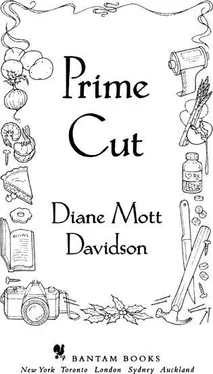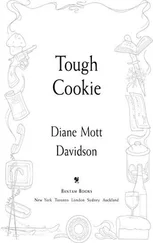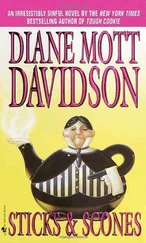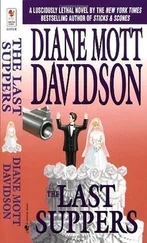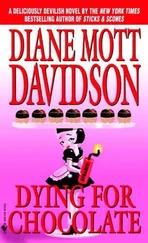“Like what?” Cameron’s voice was like gravel. “And why didn’t Leah Smythe notify our society that an item of historical significance had been found at her cabin?”
“Maybe she did.” I bit down on my impatience. “But … say Gerald Eliot discovered something out at the cabin—something besides the rifle—that got him killed at the museum.”
“And this is related to the missing cookbook you just mentioned? The one André wanted a copy of?” His forehead furrowed.
“I don’t know . I’m just trying to figure out how and why my teacher died, working in the same place that Eliot did. This summer, Eliot worked for the museum, for Merciful Migrations, and for you and me.”
Cameron Burr rubbed his chin. “He didn’t actually finish his work for you, though, did he?”
“Of course not. He took my money, made a mess, and disappeared. Next thing I knew, he’d been killed at the museum in the course of a fake robbery that might not have been fake. Why might it not have been a faked robbery? Because the cookbook of Winnie Smythe’s that was in the museum still hasn’t been recovered. Now two people are dead, and the only thing linking them is that they both worked at the Smythe cabin. What am I missing?”
His long, snorting laughter came across the phone like a truck braking on a curve. “You’re missing Charlie Smythe.”
I glanced at my watch. Twenty minutes left. “I know Charlie was a thief, and ended up in Leavenworth in 1916 for killing a teller While he was trying to rob a bank. He died in prison two years later. What else is there?”
“All right, Goldy. First, you should know where I heard what I’m going to tell you. Vic Smythe, Charlie’s son, was a friend of mine. Vic was an old-timer with the fire department when I was a recruit.”
“How long ago did he tell you these stories?”
“Thirty years.” He went on: “Charlie Smythe was a Confederate signalman during the Civil War. Came out here like a lot of folks after the conflict, restless, wanting a fresh start. Only difference was that he had money. Obtained fraudulently, as it turned out, but still his. He was only seventeen or eighteen, but smart as a whip, and ambitious. He bought land, got married, built that cabin, tried to start ranching and timbering the way mountain folk did. But he couldn’t settle down. He was always leaving Winnie out there in Blue Spruce to fend for herself.”
“Leaving for where?”
Cameron shrugged. “According to Vic, Charlie would go wherever there were horses, money, or anything valuable to be stolen. He’d be gone for weeks at a time in the summer, which was the only time you could dependably get around on horseback, if you were avoiding the roads. Word was he was up by Jackson Hole for a While, then down in New Mexico. He’d come back with a lot of cash that he would spend on boozing through the winter. Charlie Smythe never missed his family, according to Vic.”
Never missed his family? That sounded familiar; Sylvia and I had discussed just that fact. She thought Charlie had repented in prison, of course. “Do you understand that letter they have on display at the Homestead? The one that mentions his wife’s cookbook? In that, Smythe sounds as if he loved family life.”
“I know, I’ve seen that letter. Only one he ever wrote her that the family kept. Know what? Vic didn’t even believe his father had really written it, it was so full of malarkey. Soon as Vic was old enough, he had all of his parents’ possessions packed up and put away. Leah and Weezie, Vic’s daughters? They gave the whole lot to the Homestead Museum without even going through the boxes.”
“Could … Charlie … have hidden anything else in the wall, besides a rifle? Did Vic ever say his father boasted about something hidden? There are some strange markings in the cookbook—”
“I know, I know, I’ve seen them. Barbara tried to figure them out, too, but she didn’t have any luck.”
“So nobody ever figured out what those random rows of letters mean?” I asked disconsolately. “If anything?”
“Nope. Winnie had a stroke right after Charlie went to prison. She was incapacitated and never even used the cookbook after he was sent away. So if she ever did know what the letters meant, she couldn’t tell anybody. Plus, before Charlie was finally caught, he was secretive as all hell, according to lie. Charlie would He about anything. Vic even thought his father would read about crimes, then boast that he was the one who’d committed them. When the James gang went up to Minnesota, Charlie claimed to have been with them. When Butch and Sundance ended up in Bolivia, old Charlie swore he was there, but he escaped.”
“Marvelous. Great reliable source.” I smiled at Cameron. Even if this story wouldn’t help figure anything out, it was good to see him relishing a tale, instead of being angry with me.
Cameron held up a finger, as if he sensed that he wasn’t giving me helpful data. “Wait, though. There is one thing that’s interesting…. Every now and then, old Charlie He’d get remorseful, the way a drunk always does when he sobers up. One morning, Charlie sobbed to Vic that he was sorry he’d been such a rotten father. He’d been a small-time thief, he said, but he’d pulled off one last big heist and never been caught.”
I swallowed the words fish story , and only murmured, “One last heist …”
“On this particular dawn he was feeling very penitent. Old Charlie told his son that he’d never been caught for gettin’ back into his Army of the Confederacy uniform and robbing the last stagecoach that ran in Yellowstone Park.”
“Oh, please.”
Cameron shook his head slowly. “That may actually be the one true boast Charlie Smythe ever made. Although no one knows for certain, of course.”
I sighed. “Right. He made it from Yellowstone back to Blue Spruce on horseback. Alone. Carrying his loot, no doubt. For crying out loud, it takes twenty hours to drive—we’re talking a car, here—from Blue Spruce to Yellowstone. What time of year was it?”
“You want to hear the story or not?”
“Go ahead.”
“Morning of July nineteen, 1915, it was raining hard when the last commercial stagecoach started its run from West Yellowstone on its way to East Yellowstone.”
I grinned. Of course Cameron would know the date, even the weather, for this historic event.
He went on: “Folks weren’t allowed to carry firearms into the park, so the amazing thing is that more of the stagecoaches weren’t robbed. One thief, Ed Trafton, had already been caught for robbing the stagecoach the year before. But old Trafton was sitting in jail when this particular robbery took place.”
I sneaked a peek at my watch and nodded. Ten minutes to go.
“The story gets confused some, whether it was one person or two who did the robbing of that last stagecoach. But one thing’s for sure: Whether it was one or two robbers, he or they wore soldiers’ uniforms. One account says a man seated above the carriage box recognized the robber. Saw him the next day at a dance and called him by name. Called him ‘Charlie.’”
“Uh-huh.”
“And guess who was on that last stagecoach? New York financier Bernard Baruch. The robber got him for fifty dollars.”
“Right. How much did this last stagecoach robbery net, in toto?”
“Five hundred dollars, they say.”
I took a deep breath. “And that’s it?”
“Not quite. The way the story goes, a sixteen-year-old named Eugenia Braintree was on that stagecoach. She was running away from her parents. The Braintrees, very wealthy banking people from Pittsburgh, were feuding with their daughter. Eugenia wanted to work for women’s suffrage. Her parents thought this was a very bad idea. She was headstrong and took off, but not before she’d stolen a ruby necklace, a diamond brooch, and sapphire earrings from her mother. The jewelry was supposed to finance Eugenia’s escape to San Francisco, but it ended up in the robber’s sack with Bernard Baruch’s cash.” He chuckled. “Whoever took that five hundred dollars hit the jackpot with Eugenia’s jewelry. It was worth a fortune. Plus, whoever it was got away and was never caught. Supposedly, the guy named Charlie disappeared from Yellowstone the next day.”
Читать дальше
